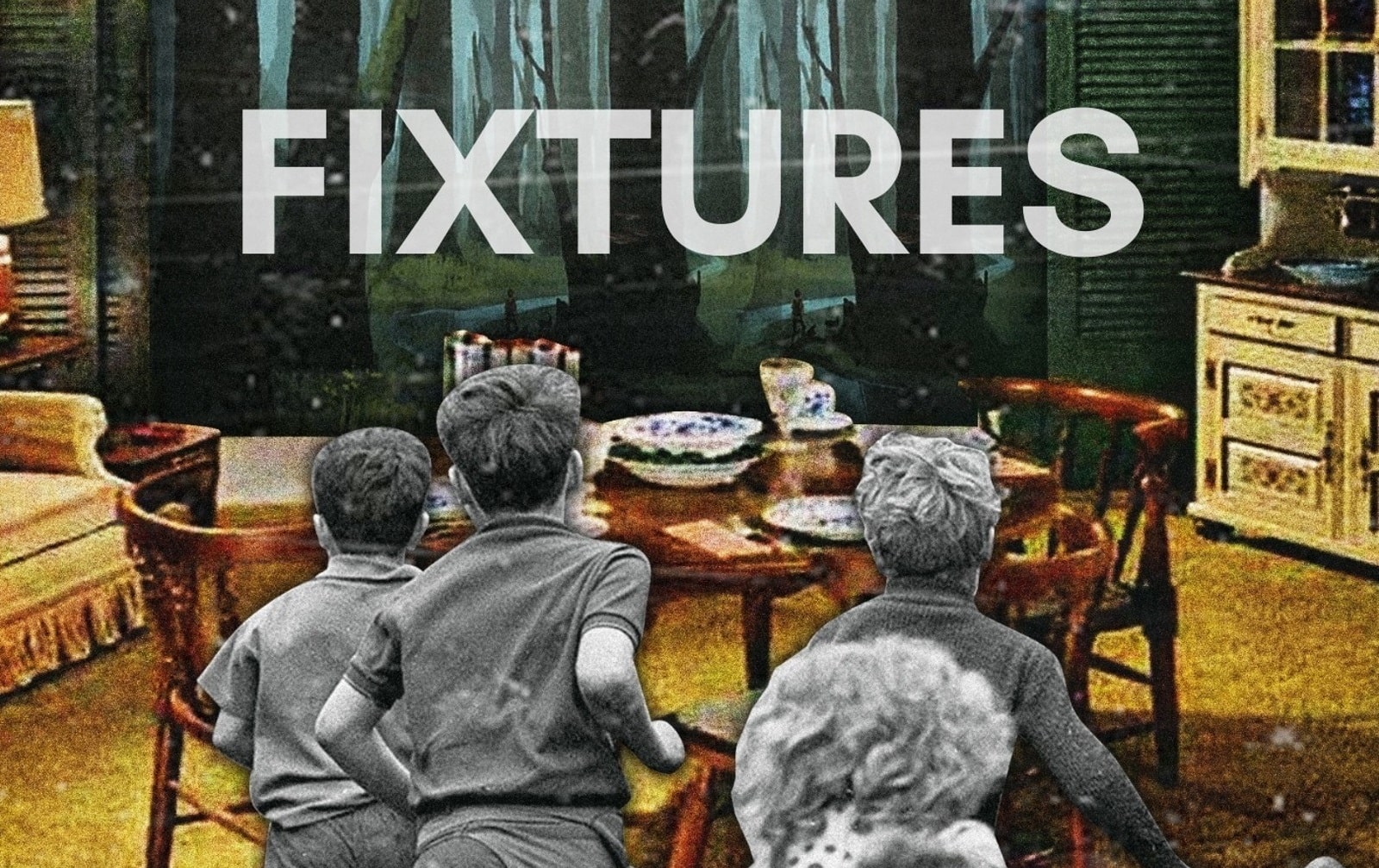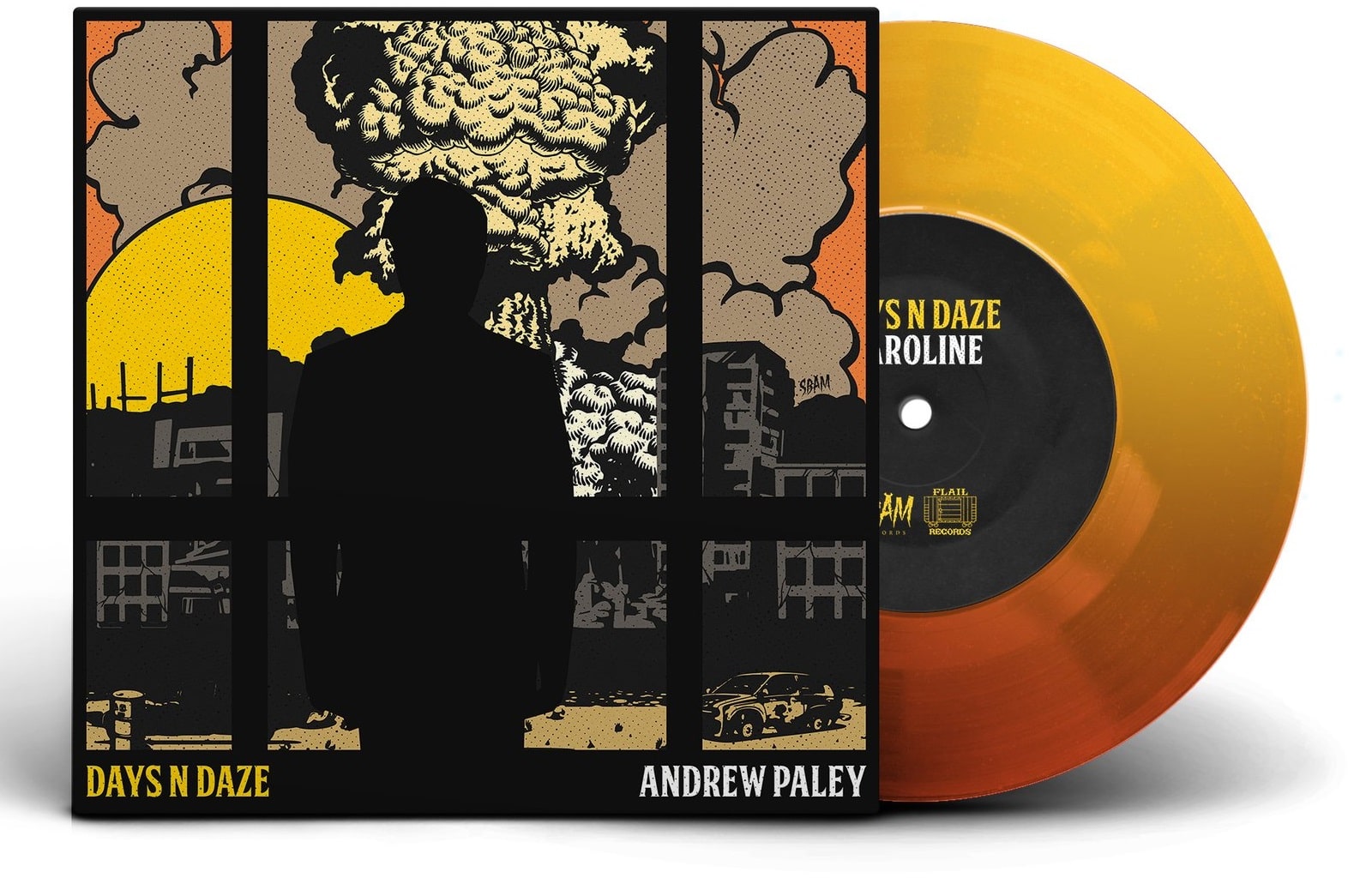Conceived, like so many other musical endeavors, as a recording project during the COVID-19 pandemic, FIXTURES could have simply provided a way to pass the time for songwriter and guitarist Kyle Shaffer before petering out. What actually happened is more interesting. As Shaffer posted snippets online as a way to cope with his isolation, the songs on “Life In Retreat” eventually found their way to the ears of drummer Cesar Salmeron and bassist Jeff Bartlett. Both musicians proved to be quick studies, learning the knotty, angular songs and providing their own character and perspective in the process. Despite the contrary momentum of the world, a band had been born.
The trio’s debut “Life In Retreat” puts emphasis on instrumentation and odd song structures, capturing a restlessness and tension throughout. The songs twist and turn, but never abandon an underlying groove laid down by the rhythm section, calling to mind early-aughts Washington D.C. post-hardcore and math rock. And while the songs pay tribute to past influences, the group explores thoroughly modern themes through lyrics about climate change and the adverse effects of technology on our humanity. Through the span of the album’s eight tracks, “Life In Retreat” simultaneously challenges listeners while inviting them back for repeat listens.
Kyle, guitars and vocalist for the band, sat down with us to share his perspetive on the band, their recording process, lyrical content and more!
Words by Kyle Shaffer
Fixtures was started as mainly a recording project for me. I had tried to get different musical projects going over the past few years and had always stalled before finding enough members to really move forward as a band.
I was frustrated at not being able to find people that I clicked with musically, and took a break from anything music-related for several months, with lots of scattered unfinished ideas left on my laptop. It was around this time (probably summer 2019) that I went to a local show on a whim and saw a Seattle band called Reader that absolutely blew me away (they are absolutely worth checking out as well).
On top of being a phenomenal live band, they were playing really adventurous, loud, technical rock music and it kind of awakened this huge realization for me that “oh wow, people are still making interesting guitar music. I thought this stuff had gone away.” Of course it hadn’t really gone away – I just wasn’t paying attention. But regardless, that show and that band are a huge reason I decided to work on Fixtures.
After that show, I started writing in a much more concentrated and directed way and decided that even if I couldn’t find other people to play this music with me, I could at least finish these songs on my own and eventually release something. I posted snippets of some of the songs on Instagram, and they eventually caught the ears of Cesar Salmerón, our drummer. This was at the very beginning of COVID and we basically struck up a conversation, thought “yeah, it would be cool to play together”, said we should reconnect when things opened up, and left it at that. I reached out to him several months later about getting together masked up to learn some of the songs and he agreed to it. We rehearsed for a few months like that, cautiously playing at a distance with lots of breaks for fresh air until we started to look for a bassist to round out the group. We found Jeff Bartlett, our bass player, through online ads and knew after one rehearsal that he was our guy. He’d played a lot growing up in the New England punk scene in bands like Breed/Extinction, and he immediately understood the sound and learned the parts quickly while adding his own input and creativity to the songs.
The entire recording process for the album was DIY, and since I had been recording these songs on my own anyway, I pushed ahead and incorporated things I liked from our practices into the songs and even booked a solitary weekend in a cabin in the Olympic Peninsula to work on vocals. With everything tracked, I spent a few months learning the basics of mixing and refined the album as best I could before releasing it online. That album is “Life In Retreat“, our debut.
𝑇ℎ𝑒 𝑡𝑖𝑡𝑙𝑒 𝑜𝑓 𝑡ℎ𝑒 𝑎𝑙𝑏𝑢𝑚 𝑖𝑠 𝑎 𝑟𝑒𝑓𝑒𝑟𝑒𝑛𝑐𝑒 𝑡𝑜 ℎ𝑜𝑤 𝑚𝑎𝑛𝑦 𝑜𝑓 𝑢𝑠 ℎ𝑎𝑣𝑒 ℎ𝑎𝑑 𝑡𝑜 𝑙𝑖𝑣𝑒 𝑑𝑢𝑟𝑖𝑛𝑔 𝑡ℎ𝑒 𝐶𝑂𝑉𝐼𝐷 𝑝𝑎𝑛𝑑𝑒𝑚𝑖𝑐 – 𝑟𝑒𝑡𝑟𝑒𝑎𝑡𝑖𝑛𝑔 𝑡𝑜 𝑜𝑢𝑟 ℎ𝑜𝑚𝑒𝑠 𝑎𝑛𝑑 𝑠𝑜𝑟𝑡 𝑜𝑓 𝑠ℎ𝑢𝑡𝑡𝑖𝑛𝑔 𝑜𝑢𝑡 𝑡ℎ𝑒 𝑜𝑢𝑡𝑠𝑖𝑑𝑒 𝑤𝑜𝑟𝑙𝑑.
But, during this time of self-imposed isolation, I began to think a lot about behavior I was noticing from people (e.g. whether or not people decided to wear masks, the hoarding of food and toilet paper while grocery shopping, my own increased use of my smartphone and social media etc.) and many of these observations seemed to point to kind of ugly truths about who we might be deep down as people. The isolation had in some ways also provided me time to think a lot about how many aspects of modern living constantly distract us and pull our attention from things we really care about. A lot of these vague thoughts and ideas found their way into the lyrics on “Life In Retreat“.
There’s not really a central concept throughout the record, but some common themes show up throughout.
The album’s first track “Never Rest” deals with the idea that we often get seduced by quick fixes or “hacks” that claim to solve some problem, but often create new problems along the way. An example could be something like a “productivity” app on our phones that is supposed to make us more organized and efficient, but often we end up spending our time using these tools instead of using that free time to connect with friends or family or work on something we’re passionate about. It’s a kind of trap masquerading as a solution.
The third track “Hidden Cost” deals more directly with the idea of how our attention is often treated as a commodity to be used by technology. The first lines introduce that the most directly: “The attention you pay, all the words you might say, all just piss in the wind.” The whole song is a fairly pessimistic take on how we don’t realize that the distractions of modern entertainment incur the cost that we don’t factor in – namely our time, which is something that we can spend, but never get back.
The album’s last track “Divide By One” concerns how, at least in the United States, people are willing to do damage to the greater good as long as they can maintain their own individual comfort. The line in the first verse “Fortify in unity, but everything divides by one” introduces this idea in an indirect way. Many of the lyrics also deal with the prospect that if we continue to prioritize our own individual comfort and preferences over communal progress, we’ll approach a point of no return where we can’t fix serious crises that threaten us. The climate crisis is the most immediate threat that comes to mind.
𝐹𝑟𝑜𝑚 𝑎𝑛 𝑖𝑛𝑠𝑡𝑟𝑢𝑚𝑒𝑛𝑡𝑎𝑙 𝑝𝑒𝑟𝑠𝑝𝑒𝑐𝑡𝑖𝑣𝑒, 𝑤𝑒’𝑟𝑒 𝑎𝑙𝑙 𝑖𝑛𝑡𝑒𝑟𝑒𝑠𝑡𝑒𝑑 𝑖𝑛 𝑎𝑔𝑔𝑟𝑒𝑠𝑠𝑖𝑣𝑒 𝑚𝑢𝑠𝑖𝑐 𝑡ℎ𝑎𝑡’𝑠 𝑐𝑜𝑚𝑝𝑙𝑒𝑥 𝑎𝑛𝑑 𝑝𝑢𝑠ℎ𝑒𝑠 𝑏𝑜𝑢𝑛𝑑𝑎𝑟𝑖𝑒𝑠.
We’re definitely not as aggressive as, say, a metal band, but we wanted elements of noisiness and aggression on the album. For song structures, you won’t hear a lot of “verse-chorus-verse” on the album, and we’re really interested in combining non-standard song structures with odd time signatures while maintaining an underlying groove. We’re really inspired by lots of Dischord and Desoto Records artists from the late 90’s and early 2000’s (Fugazi, Faraquet, Medications, Q and not U, Burning Airlines, Jawbox, Shiner, etc.) and I think many of those influences come through on the album with our own spin applied to it. Overall, we put a heavy emphasis on musicianship while trying to maintain musicality and flow throughout songs.











